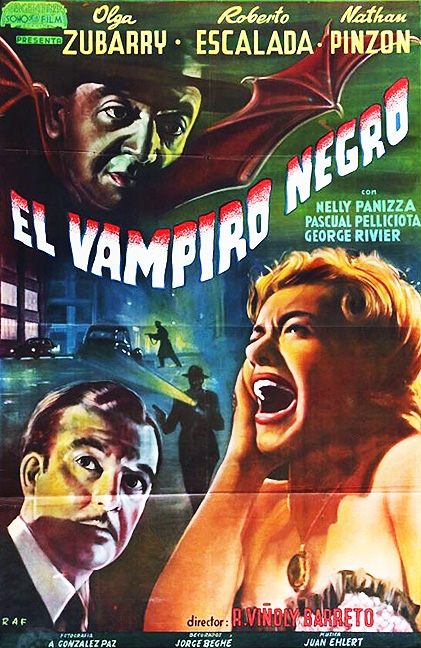
Long-time readers know that the highlight of my year is Noir City, the fantastic film festival at the Castro Theatre, created and sponsored by the Film Noir Foundation. As this year’s events were gradually canceled, I started preemptively mourning the ten days I typically spend glued to my seat (audience left, near the exit) watching twenty-something phenomenal films.
Much to my delight, the Film Noir Foundation and the American Film Institute are hosting the program online, at this link. The movies come with terrific introductions by Eddie Muller, known to us noiristas as “the Czar of Noir” and other members of FNF, as well as expert film critics and scholars. I thought it might be fun if I supplemented some of these with a bit of criminological commentary.
This first comment is about the fantastic film El Vampiro Negro (Argentina, 1953), which starts with a title frame explaining that the film is based on real-life events from Europe. Indeed, like Fritz Lang’s M (1931), El Vampiro Negro is based on the life and crimes of Peter Kürten, the “Vampire of Düsseldorf.” Both films are excellent and, while cinephiles and Lang fans may see this as blasphemy, I think that El Vampiro Negro is the best of the two, for various cinematic and criminological reasons. Both Peter Lorre and Nathán Pinzón are excellent in the respective title roles of the serial killer, and the atmosphere is well-captured in both, but I think that the Argentinian script’s inclusion of the nightclub singer, played by Olga Zubarry, makes such a terrific, truly moral, appealing counterpart not only to the rotten morality of the serial killer, but also to the hypocrisy of the prosecutor. One roots for Zubarry’s character as she plays an important role in catching the criminal.
But more importantly, the inclusion of the nightclub singer provides a much more interesting criminological statement. In M, the murderer is apprehended and tried by a kangaroo court of the underworld, in which a “prosecutor” and a “defense attorney” respectively argue for positions corresponding to the classicist (“he chose to do evil and we must deter others!”) and positivist (“he can’t help himself!”) schools of criminology. This dichotomy emerges in El Vampiro Negro as well, not through a kangaroo court but through scenes from the murderer’s trial, which are interestingly portrayed at the beginning of the movie. I think the playwright made this decision because the film wants to say something more interesting.
At some point in the movie, there’s a scene from the prosecutor’s home life, including his wife, who is disabled. Later, the prosecutor befriends the nightclub singer, coming to her home, and warning her that her daughter might be taken away from her because of her occupation. He then bemoans his own loneliness, tells her that she, too, must be lonely, and makes his move. The nightclub singer–what a terrific character!–pushes him away, screams at him that he’s scum and that she prefers the lowlifes from the club, and throws him out of her home.
The inclusion of these two scenes frames the main dilemma in the movie in a much more interesting way. It’s not just a good-versus-evil flick (though the serial killer is, indeed, evil), and it’s not just a choice-versus-predetermination flick (though the serial killer does evoke this conversation): it’s also a conversation about the hypocrisies of the lawmakers themselves and their audacity to judge others. This folds in labeling and conflict theories, which I think make the latter film richer from a theoretical perspective.
Watch both (M; El Vampiro Negro) and tell me what you think!




No comment yet, add your voice below!